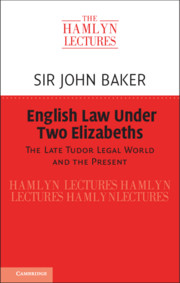Book contents
- English Law under Two Elizabeths
- English Law under Two Elizabeths
- Copyright page
- Contents
- The Hamlyn Trust
- The Hamlyn Lectures
- Preface
- Table of Statutes
- Table of Cases
- Abbreviations
- 1 The English Legal System under Elizabeth I
- 2 The Elizabethan Common Law
- 3 An Age of Common Law and an Age of Statute?
- 4 The Elizabethan Inheritance
- 5 Comparing Then and Now
- Index
1 - The English Legal System under Elizabeth I
Published online by Cambridge University Press: 19 January 2021
- English Law under Two Elizabeths
- English Law under Two Elizabeths
- Copyright page
- Contents
- The Hamlyn Trust
- The Hamlyn Lectures
- Preface
- Table of Statutes
- Table of Cases
- Abbreviations
- 1 The English Legal System under Elizabeth I
- 2 The Elizabethan Common Law
- 3 An Age of Common Law and an Age of Statute?
- 4 The Elizabethan Inheritance
- 5 Comparing Then and Now
- Index
Summary
This chapter surveys the principal features of the legal system of the later sixteenth century, beginning with the courts and their functions. Trials took place at the assizes in the country, separated from the legal argument in Westminster Hall. The court at Westminster did not hear the evidence but had to take the facts as encapsulated in Latin; the effect of this separation is considered. In absence of appeals as we know them, judges were unwilling to decide difficult cases, though the desire for unanimity was giving way to an acceptance of majority decisions. The cost of litigation was much lower than today, and most litigants in the highest courts were of a social status below the gentry. The chapter ends with an account of the legal profession in this period, which saw the rise of the solicitor. The inns of court played a central role as a residential legal university, attended by a substantial proportion of the English gentry.
Keywords
- Type
- Chapter
- Information
- English Law Under Two ElizabethsThe Late Tudor Legal World and the Present, pp. 1 - 33Publisher: Cambridge University PressPrint publication year: 2021

